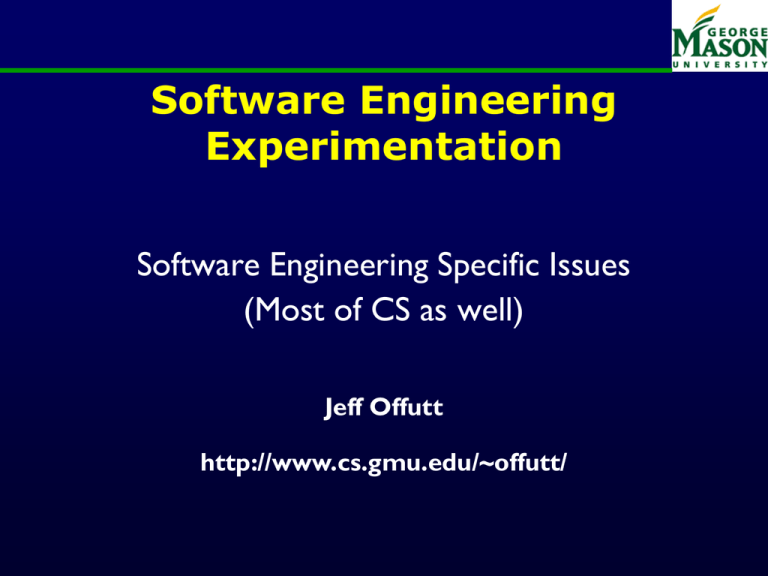Software Engineering issues
advertisement

Software Engineering Experimentation Software Engineering Specific Issues (Most of CS as well) Jeff Offutt http://www.cs.gmu.edu/~offutt/ Obstacles to Experimentation 1. The biggest obstacle to software engineering experimentation is that our populations are unknown – – – What is a representative collection of programs? Faults? Developers? 2. Second : Industry won’t cooperate – In other engineering fields, companies provide access to data, resources, processes, and people 3. Third : “Knowledge inversion” – senior scientists often do not know as much about experimentation as younger scientists © Jeff Offutt, 2007-2012 2 1. Unknown Populations • How many programs are enough for external validity? • Are seeded faults as good as natural faults? • Does using students bias the results? • How do we analyze our results? © Jeff Offutt, 2007-2012 3 Statistical Tests and Software • Experimental data based on programs cannot, with validity, be subjected to inferential statistical tests since the population is unknown • An unknown population nullifies any statistical result that would be obtained, regardless of the number of programs • Only descriptive statistics can be used – For example, log linear analysis • That is, statistical hypothesis testing, at least in the statistical sense, is not accurate in most of our studies © Jeff Offutt, 2007-2012 4 2. Industry Cooperation • Researchers need access to data from industry to know how techniques work in practice • Very difficult to get research funding from industry – Several years ago, my student applied a high-end testing technique to real-time, safety-critical software, finding several bugs • She was refused permission to publish, because “customers might think our software is not perfect” – More years ago, a former student applied a test technique I invented to Cisco’s routing software, finding several bugs, one very severe, saving millions of dollars • $750,000 bonus! • Almost fired for telling me • Her boss asked me to sign a non-disclosure agreement, afterwards © Jeff Offutt, 2007-2012 5 3. Knowledge Inversion • Every generation of computer scientists has taken a step forward – – – – – ’70s – ’80s: No validation at all ’80s : We built systems ’80s – ’90s : Results on small sets of data ’90s : Careful experimental design, larger data sets 2000s : Sophisticated statistical analysis of results • Many journal and conference reviewers lack knowledge to evaluate experiments © Jeff Offutt, 2007-2012 6 Confounding Variables in Software A partial list of common confounding variables, from previous courses 1. 2. 3. 4. The Human Element Scalability and Generality Conduct of Experiment Other © Jeff Offutt, 2007-2012 7 1. The Human Element • Grant money – source – amount • Motivation – Sponsor – Subject • Capabilities of programmer – – – – – – – – – • • knowledge experience skills birth order IQ status handedness personality traits attention to detail Physical environment Feedback to subjects • • • • • Subjects expectations Learning curve Amount and type of training Natural language Time of day experimentation conducted • Group organization • Communication – skills – type allowed – Structure • Researchers – knowledge – experience – skills • Culture of subjects © Jeff Offutt, 2007-2012 8 2. Scalability and Generality • • • • • • Size of project Application domain Programming language Number of artifacts/subjects Sampling of artifacts Source of artifacts – real or custom built – how created © Jeff Offutt, 2007-2012 9 3. Conduct of Experiment • • • • • • • • Duration of experiment Measure of artifact Support tools Specifications Hardware Support software Method of data collection Order of experimental process © Jeff Offutt, 2007-2012 10 4. Other • • • • • Method Oracle quality Complexity of change Experimental design Direction of hypothesis © Jeff Offutt, 2007-2012 11 Principles to Follow 1) We make progress through continuous, sustained, small, steps – not technological breakthroughs • • • Scientists take baby steps The “big step” is the last of many The Web was the last of thousands of baby steps 2) Collect your data very carefully • • • Identify and control variables Document all decisions Save all data – you may have to repeat the experiment years later © Jeff Offutt, 2007-2012 12 Principles to Follow (2) 3) Collecting is not the goal, analysis and conclusions are the goals • • Don’t lose the forest in the trees Conclusions matter more than measurement 4) Data are uncertain and fallible – design experiments to allow for problems • • In real science, we always have too many variables In real experiments, we always lose some data 5) Non-inventors need to carry out experiments • If I validate my invention, I’m hopelessly biased 6) The goal of an experiment in software is to help companies develop better software, cheaper – The goal should NOT be to publish another paper © Jeff Offutt, 2007-2012 13 Summary • Computing is an “inventive” field • Evaluation means determining how useful our inventions are • Experimentation is the most widely used way to evaluate computing research Expectations for evaluation increases every year © Jeff Offutt, 2007-2012 14 Be Problem Solvers • As graduate students, you have learned to be good at solving problems • Much of life is about solving problems • Education is not about skills, it is about knowledge • Utilize your education knowledge to help you: – Think rationally – Question authority – Solve all of life’s problems © Jeff Offutt, 2007-2012 15


